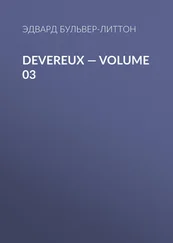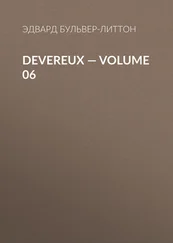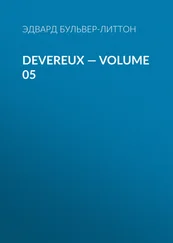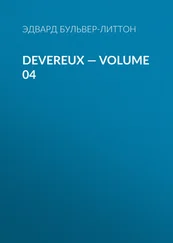Эдвард Бульвер-Литтон - Devereux — Complete
Здесь есть возможность читать онлайн «Эдвард Бульвер-Литтон - Devereux — Complete» — ознакомительный отрывок электронной книги совершенно бесплатно, а после прочтения отрывка купить полную версию. В некоторых случаях можно слушать аудио, скачать через торрент в формате fb2 и присутствует краткое содержание. Жанр: foreign_prose, История, literature_19, Европейская старинная литература, foreign_edu, foreign_antique, на английском языке. Описание произведения, (предисловие) а так же отзывы посетителей доступны на портале библиотеки ЛибКат.
- Название:Devereux — Complete
- Автор:
- Жанр:
- Год:неизвестен
- ISBN:нет данных
- Рейтинг книги:5 / 5. Голосов: 1
-
Избранное:Добавить в избранное
- Отзывы:
-
Ваша оценка:
- 100
- 1
- 2
- 3
- 4
- 5
Devereux — Complete: краткое содержание, описание и аннотация
Предлагаем к чтению аннотацию, описание, краткое содержание или предисловие (зависит от того, что написал сам автор книги «Devereux — Complete»). Если вы не нашли необходимую информацию о книге — напишите в комментариях, мы постараемся отыскать её.
Devereux — Complete — читать онлайн ознакомительный отрывок
Ниже представлен текст книги, разбитый по страницам. Система сохранения места последней прочитанной страницы, позволяет с удобством читать онлайн бесплатно книгу «Devereux — Complete», без необходимости каждый раз заново искать на чём Вы остановились. Поставьте закладку, и сможете в любой момент перейти на страницу, на которой закончили чтение.
Интервал:
Закладка:
With my brother Gerald, I had a deadly and irreconcilable feud. He was much stouter, taller, and stronger than myself; and, far from conceding to me that respect which I imagined my priority of birth entitled me to claim, he took every opportunity to deride my pretensions, and to vindicate the cause of the superior strength and vigour which constituted his own. It would have done your heart good to have seen us cuff one another, we did it with such zeal. There is nothing in human passion like a good brotherly hatred! My mother said, with the most feeling earnestness, that she used to feel us fighting even before our birth: we certainly lost no time directly after it. Both my parents were secretly vexed that I had come into the world an hour sooner than my brother; and Gerald himself looked upon it as a sort of juggle,—a kind of jockeyship by which he had lost the prerogative of birthright. This very early rankled in his heart, and he was so much a greater favourite than myself that, instead of rooting out so unfortunate a feeling on his part, my good parents made no scruple of openly lamenting my seniority. I believe the real cause of our being taken from the domestic instructions of the Abbe (who was an admirable teacher) and sent to school, was solely to prevent my uncle deciding everything in my favour. Montreuil, however, accompanied us to our academy, and remained with us during the three years in which we were perfecting ourselves in the blessings of education.
At the end of the second year, a prize was instituted for the best proficient at a very severe examination; two months before it took place we went home for a few days. After dinner my uncle asked me to walk with him in the park. I did so: we strolled along to the margin of a rivulet which ornamented the grounds. There my uncle, for the first time, broke silence.
“Morton,” said he, looking down at his left leg, “Morton, let me see; thou art now of a reasonable age,—fourteen at the least.”
“Fifteen, if it please you, sir,” said I, elevating my stature as much as I was able.
“Humph! my boy; and a pretty time of life it is, too. Your brother Gerald is taller than you by two inches.”
“But I can beat him for all that, uncle,” said I, colouring, and clenching my fist.
My uncle pulled down his right ruffle. “‘Gad so, Morton, you’re a brave fellow,” said he; “but I wish you were less of a hero and more of a scholar. I wish you could beat him in Greek as well as in boxing. I will tell you what Old Rowley said,” and my uncle occupied the next quarter of an hour with a story. The story opened the good old gentleman’s heart; my laughter opened it still more. “Hark ye, sirrah!” said he, pausing abruptly, and grasping my hand with a vigorous effort of love and muscle, “hark ye, sirrah,—I love you,—‘Sdeath, I do. I love you better than both your brothers, and that crab of a priest into the bargain; but I am grieved to the heart to hear what I do of you. They tell me you are the idlest boy in the school; that you are always beating your brother Gerald, and making a scurrilous jest of your mother or myself.”
“Who says so? who dares say so?” said I, with an emphasis that would have startled a less hearty man than Sir William Devereux. “They lie, Uncle; by my soul they do. Idle I am; quarrelsome with my brother I confess myself; but jesting at you or my mother—never—never. No, no; you , too, who have been so kind to me,—the only one who ever was. No, no; do not think I could be such a wretch:” and as I said this the tears gushed from my eyes.
My good uncle was exceedingly affected. “Look ye, child,” said he, “I do not believe them. ‘Sdeath, not a word; I would repeat to you a good jest now of Sedley’s, ‘Gad, I would, but I am really too much moved just at present. I tell you what, my boy, I tell you what you shall do: there is a trial coming on at school—eh?—well, the Abbe tells me Gerald is certain of being first, and you of being last. Now, Morton, you shall beat your brother, and shame the Jesuit. There; my mind’s spoken; dry your tears, my boy, and I’ll tell you the jest Sedley made: it was in the Mulberry Garden one day—” And the knight told his story.
I dried my tears, pressed my uncle’s hand, escaped from him as soon as I was able, hastened to my room, and surrendered myself to reflection.
When my uncle so good-naturedly proposed that I should conquer Gerald at the examination, nothing appeared to him more easy; he was pleased to think I had more talent than my brother, and talent, according to his creed, was the only master-key to unlock every science. A problem in Euclid or a phrase in Pindar, a secret in astronomy or a knotty passage in the Fathers, were all riddles, with the solution of which application had nothing to do. One’s mother-wit was a precious sort of necromancy, which could pierce every mystery at first sight; and all the gifts of knowledge, in his opinion, like reading and writing in that of the sage Dogberry, “came by nature.” Alas! I was not under the same pleasurable delusion; I rather exaggerated than diminished the difficulty of my task, and thought, at the first glance, that nothing short of a miracle would enable me to excel my brother. Gerald, a boy of natural talent, and, as I said before, of great assiduity in the orthodox studies,—especially favoured too by the instruction of Montreuil,—had long been esteemed the first scholar of our little world; and though I knew that with some branches of learning I was more conversant than himself, yet, as my emulation had been hitherto solely directed to bodily contention, I had never thought of contesting with him a reputation for which I cared little, and on a point in which I had been early taught that I could never hope to enter into any advantageous comparison with the “genius” of the Devereuxs.
A new spirit now passed into me: I examined myself with a jealous and impartial scrutiny; I weighed my acquisitions against those of my brother; I called forth, from their secret recesses, the unexercised and almost unknown stores I had from time to time laid up in my mental armoury to moulder and to rust. I surveyed them with a feeling that they might yet be polished into use; and, excited alike by the stimulus of affection on one side and hatred on the other, my mind worked itself from despondency into doubt, and from doubt into the sanguineness of hope. I told none of my design; I exacted from my uncle a promise not to betray it; I shut myself in my room; I gave out that I was ill; I saw no one, not even the Abbe; I rejected his instructions, for I looked upon him as an enemy; and, for the two months before my trial, I spent night and day in an unrelaxing application, of which, till then, I had not imagined myself capable.
Though inattentive to the school exercises, I had never been wholly idle. I was a lover of abstruser researches than the hackneyed subjects of the school, and we had really received such extensive and judicious instructions from the Abbe during our early years that it would have been scarcely possible for any of us to have fallen into a thorough distaste for intellectual pursuits. In the examination I foresaw that much which I had previously acquired might be profitably displayed,—much secret and recondite knowledge of the customs and manners of the ancients, as well as their literature, which curiosity had led me to obtain, and which I knew had never entered into the heads of those who, contented with their reputation in the customary academical routine, had rarely dreamed of wandering into less beaten paths of learning. Fortunately too for me, Gerald was so certain of success that latterly he omitted all precaution to obtain it; and as none of our schoolfellows had the vanity to think of contesting with him, even the Abbe seemed to imagine him justified in his supineness.
Читать дальшеИнтервал:
Закладка:
Похожие книги на «Devereux — Complete»
Представляем Вашему вниманию похожие книги на «Devereux — Complete» списком для выбора. Мы отобрали схожую по названию и смыслу литературу в надежде предоставить читателям больше вариантов отыскать новые, интересные, ещё непрочитанные произведения.
Обсуждение, отзывы о книге «Devereux — Complete» и просто собственные мнения читателей. Оставьте ваши комментарии, напишите, что Вы думаете о произведении, его смысле или главных героях. Укажите что конкретно понравилось, а что нет, и почему Вы так считаете.












